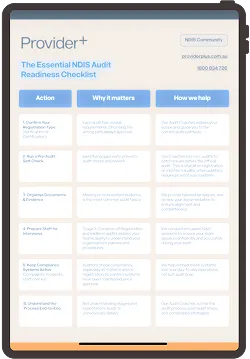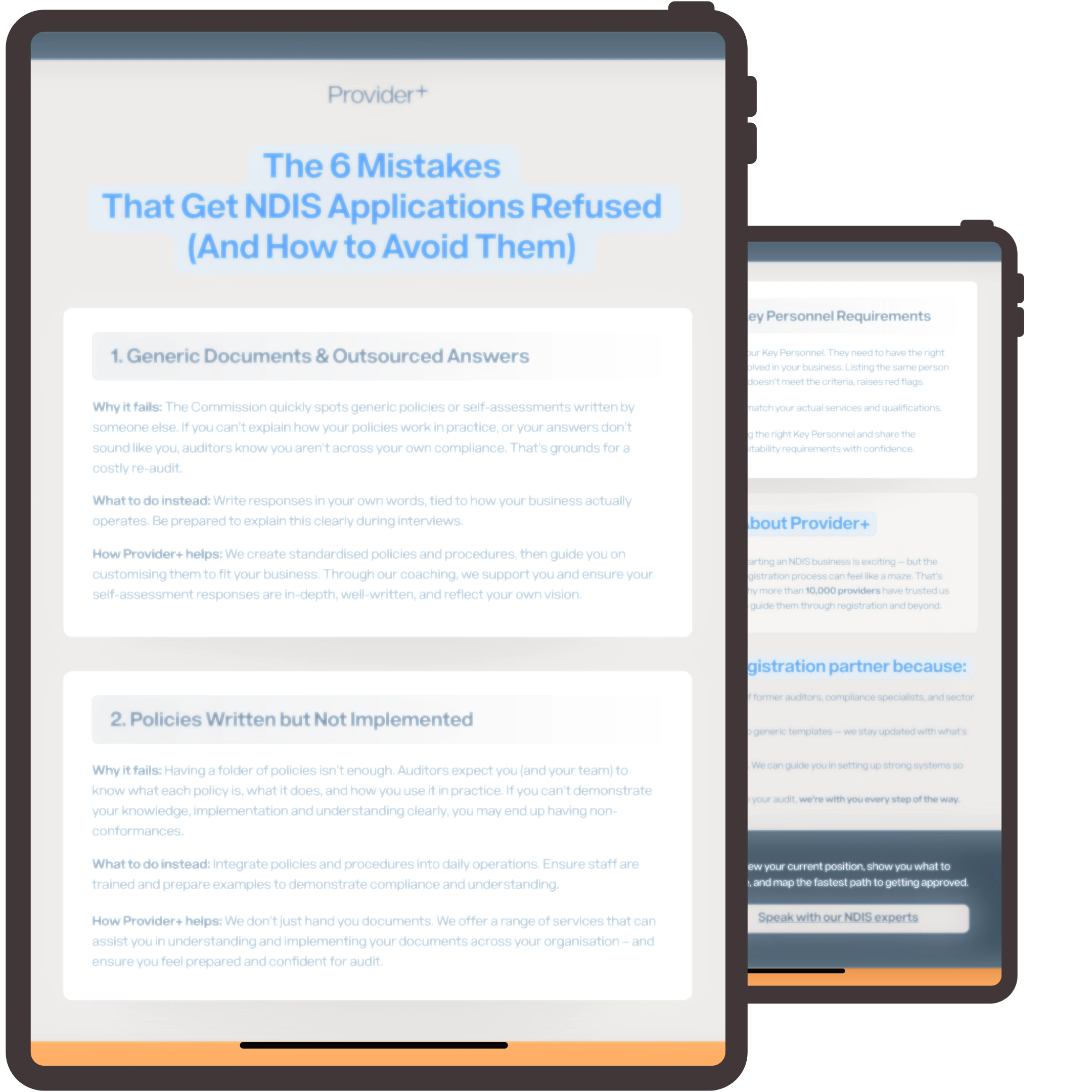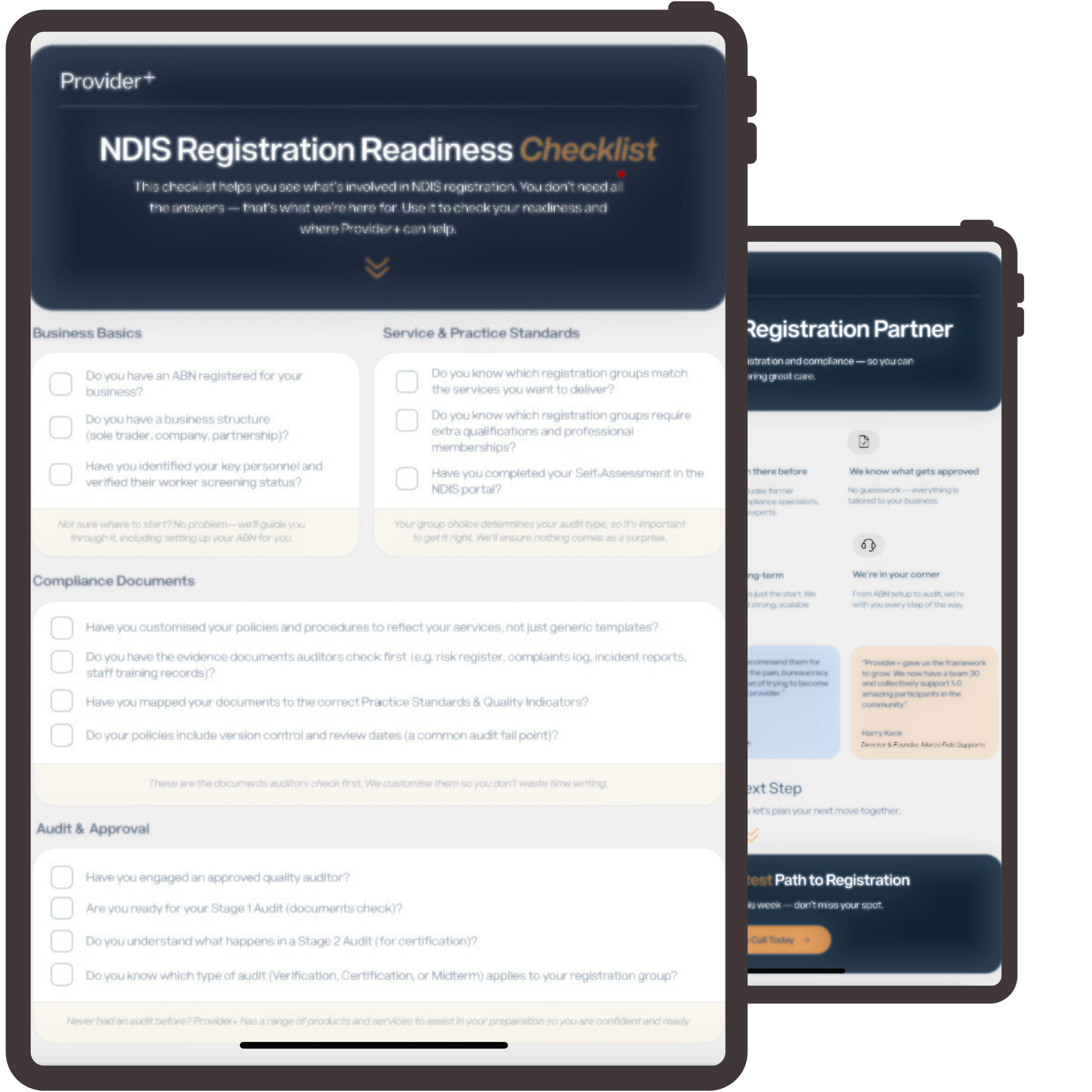Thinking About Aged Care Registration?
There's a lot of misinformation about aged care registration right now.
AI-generated content is recycling outdated Commission guidance. Generic blog posts are oversimplifying requirements that will get applications rejected. You've also probably heard that aged care registration is similar to NDIS registration. Or that it's straightforward and just a matter of filling out the application correctly.
The truth: The Aged Care Quality and Safety Commission runs one of Australia's most rigorous registration processes - and they've designed it that way deliberately. It's not like NDIS registration. The Commission explicitly prohibits the use of templates and AI-generated content, demands higher evidence standards, and rejects applications where consultants have clearly done the writing. Most providers underestimate what's actually required and this can lead to rejections that could have been avoided.
Why you should trust us:
Our team has been in aged care compliance since before NDIS existed. Our senior consultants have decades of aged care experience - they've worked as Commission auditors, conducted hundreds of aged care assessments, and supported successful registrations across every category.
If you're exploring aged care registration, you deserve to know exactly what you're signing up for before you commit time, money, or energy to the process. This factsheet offers the guidance you need to make the right decision.
Why the Process Is So Intensive
The Commission has legislated power to approve applications, reject them, or revoke registrations. They're responsible for ensuring every provider entering the aged care sector can deliver safe, quality care to older Australians.
What that means for you:
The Commission doesn't just want to see paperwork - they want proof that you have the capability, experience, and systems to deliver quality aged care services long-term.
The most important thing to understand upfront:
This isn't bureaucracy for the sake of it - it's designed to ensure you genuinely understand what you're committing to before you start serving vulnerable Australians.
How? Firstly, by writing your own application. The Commission explicitly prohibits templates, prefabricated responses, and AI-generated content. They want to see your knowledge and your understanding of aged care obligations.
If your application looks like consultant work, it risks rejection. Consultants can guide you, but you must demonstrate your own expertise in your responses.
What You'll Need to Apply For
You must register in at least one of six categories:
- Home and community services
- Assistive technology and home modifications
- Advisory and support services
- Personal care and care support in the home or community
- Nursing and transition care
- Residential care
Categories 4-6 require a full audit as part of your application. This means you need functioning systems in place before you apply - not just plans to implement systems later.
Important: If you want to deliver ongoing home care, you must also provide care management services. This requires applying for Category 4 regardless of which other categories you're pursuing.
What It Actually Costs
The Commission operates on cost recovery. Here's what you'll pay:
Application Fees
Depending on which categories you apply for, expect total application costs between $3,270 and $29,000+.
These costs repeat every 18 months. The Commission continuously assesses your suitability through renewal cycles. If you don't meet requirements at renewal, they'll revoke your registration.
Need help calculating your total costs? Use this fee calculator for your specific situation.
Who Can Get Approved
Legal structure (company, sole trader, partnership, co-operative) is the simple part. The Commission's real assessment focuses on capability and suitability.
1. Demonstrated Track Record
You must prove extensive experience delivering aged care or directly comparable services, with documented evidence of:
- Your service delivery framework and care model
- Duration of service provision
- Client volumes and geographic coverage
- Quality outcomes and performance metrics
- Previous regulatory assessments (if applicable)
This must be your organisation's direct experience. Parent company achievements, franchise network data, or related entity performance doesn't satisfy this requirement.
If you work with associated providers (subcontractors, partner organisations), you're responsible for ensuring they meet all obligations too. The Commission assesses these relationships as part of your suitability.
Supporting evidence typically includes: Independent audit reports, quality assurance data, care outcome documentation, client satisfaction metrics, regulatory compliance history.
2. Financial Capacity and Sustainability
Prove financial viability for minimum three years post-approval through:
- Comprehensive financial management and governance frameworks
- Clear authority structures for financial decision-making
- Long-term viability modeling with realistic assumptions
- Demonstrated financial oversight capability
- Independent audit processes (where applicable)
Which financial standards apply to you:
- Categories 4, 5, 6: Financial and Prudential Management Standard applies (except government entities and local government authorities for Category 6)
- Category 6 only: Investment Standard and Liquidity Standard apply - even if you don't hold refundable deposits (exemptions for government entities, local authorities, and NATSIFAC providers)
3. Responsible Person Suitability
Under Section 12 of the Aged Care Act, every person in a position of authority or influence must pass suitability checks. This includes:
For non-government providers:
- Anyone responsible for executive decisions
- Anyone with authority, responsibility, or significant influence over planning, directing, or controlling provider activities
For all providers:
- Registered nurses responsible for overall management of nursing services
- Anyone responsible for day-to-day running of residential care homes or service delivery branches
- All governing body members (as they're responsible for executive decisions)
Examples: Board members, company directors (including shadow directors), CEO, executive management team, director of nursing, nurse managers, service and facility managers
Your obligations under Section 13 of the Aged Care Act:
- Ensure all responsible persons comply with worker screening requirements (Aged Care Rules 2025)
- Assess their suitability at least once per year
- Notify the Commission of any changes
- Have processes ensuring responsible persons report changes in circumstances
Each responsible person:
- Must pass worker screening requirements
- Cannot have current or past banning orders (aged care or NDIS)
- Cannot have had previous registration revoked (unless they requested it)
- Must be assessed for suitability annually
- Must comply with all relevant Commonwealth, State, and Territory laws
4. Operational Systems Evidence (Categories 4-6)
If you're applying for Categories 4, 5, or 6, you'll undergo an audit against the Aged Care Quality Standards as part of your application.
This means you need:
- All policies and procedures operational
- All systems functional and demonstrable
- Evidence that your systems work in practice - not just documentation
The audit costs $14,870 and won't proceed until you've met all general registration requirements.
Special Requirements for Specific Service Types
If you're delivering ongoing home care: You must also provide care management services, which means you must apply for and meet Category 4 requirements.
If you're delivering End-of-Life Pathway care (short-term care for people expected to live three months or less who want to stay at home): You must also provide care management services under Category 4.
If you're delivering restorative care management (short-term programs helping older people recover or maintain abilities): You must also deliver allied health and therapy services under Category 4.
For Category 6 (Residential care): You must meet approval requirements for at least one residential care home. You can apply for residential care home approval as part of the registration process, but you won't be registered in Category 6 if you don't meet these requirements.
Additional Requirements for Categories 5 & 6
Governing Body Structure
Providers registered in Category 5 (Nursing and transition care) and Category 6 (Residential care, including respite) must ensure their governing body has:
- A majority of independent non-executive members
- At least one member with clinical care experience
Exemptions - You don't need to meet these requirements if you're:
- A government entity or local government authority
- Delivering only Categories 1-3 (Home and community services, Assistive technology and home modifications, Advisory and support services)
- A registered provider delivering to fewer than 40 older people AND have a governing body with fewer than 5 members
- An Aboriginal Community Controlled Organisation
- A co-operative registered under the Co-operatives National Law (or Co-operatives Act 2009 WA) with specific rule clauses (exempt from independent non-executive member requirement only)
- Holding a determination under Section 159 of the Aged Care Act stating you don't need to meet one or both requirements
Consumer Advisory Bodies
Registered providers in Category 5 (Nursing and transition care) and Category 6 (Residential care, including respite) must meet consumer advisory body obligations.
What this means:
Consumer advisory bodies give older people a voice in how you deliver their care and services. They also give your governing body valuable feedback on quality and service delivery.
Your obligations:
- Write to people receiving your services at least once every 12 months offering to establish one or more consumer advisory bodies
- Size and structure should reflect the people receiving your care
- If you establish consumer advisory bodies, your governing body must consider all feedback when making decisions about care and services
- Respond in writing to consumer advisory bodies explaining how you considered their feedback
Your consumer advisory bodies should:
- Include people receiving care and their supporters
- Represent the diverse backgrounds of older people receiving care
- Support people who might find it hard to participate (translators, interpreters, vision/hearing support)
- Have opportunities to give feedback to the governing body on quality of aged care provided
- Have representatives from different services and types of care you offer
Participation is voluntary. If older people aren't getting involved, investigate what's stopping them and address barriers.
The Application Process
Here's what happens after you submit:
1. Initial Assessment
The Commission reviews whether you meet general and category-specific requirements.
2. Audit (if applicable)
For Categories 4-6, an audit is conducted against Quality Standards - but only if you've met general requirements first.
3. Requests for Information
If the Commission needs additional details, they'll request them before deciding.
4. Notice of Possible Refusal
If they're considering rejection, they'll issue a notice outlining concerns and give you a chance to respond. Multiple notices may be issued for different concerns.
5. Notice of Decision
Within 14 days of the final decision, you'll be notified of the outcome.
If approved: Your details go on the Provider Register and are published on the Commission's website.
If refused: You can apply for reconsideration of reviewable decisions.
Why This Is Different from NDIS
Many providers come to aged care registration with NDIS experience and assume the processes are similar.
They're not.
While both involve quality standards and audits, aged care registration:
- Requires you to write your own application (no templates allowed)
- Has stricter evidence requirements for experience and capability
- Includes mandatory financial viability assessments
- Requires governing body restructuring for many providers (Categories 5-6)
- Mandates consumer advisory bodies
- Has higher upfront and ongoing costs
- Operates on 18-month renewal cycles (vs NDIS's 3-year cycles)
- Has zero tolerance for consultant-written applications
The Commission is explicit: They want to assess whether you understand aged care obligations, not whether you hired someone who does.
Common Misconceptions
"A consultant can just handle it for me"
No. The Commission prohibits this. Consultants can guide you, but you must write the application yourself based on your own knowledge and experience. Applications that look like consultant work risk rejection.
"It's just like NDIS registration"
No. The evidence requirements are steeper, the financial scrutiny is more intense, and you can't use templates or AI for any part of your application or policies.
"I can use template policies"
No. All policies and procedures must be customised and specific to your organisation. Generic or template policies will be flagged.
"If I have experience in disability support, that's enough"
Maybe. You need to demonstrate extensive experience in aged care or similar services, and provide concrete evidence of performance and outcomes. The Commission assesses each application individually.
"The audit is just a formality"
No. The audit (for Categories 4-6) assesses whether your systems actually work in practice. You need functioning systems, not just documentation. Applications fail at this stage regularly.
Before You Apply: Honest Self-Assessment
You're ready to apply if:
✅ You have proven experience delivering aged care or similar services
✅ You can document your track record with concrete evidence (audit reports, quality data, client outcomes)
✅ You understand aged care obligations deeply - not just surface knowledge
✅ You have functioning systems in place (for Categories 4-6)
✅ You can demonstrate 3-year financial viability
✅ All responsible persons pass suitability requirements and can be assessed annually
✅ You're prepared to write your own application based on your knowledge
✅ You understand this is an 18-month renewal cycle with associated costs
✅ You comply with all relevant Commonwealth, State, and Territory laws
✅ You have no current or past banning orders (aged care or NDIS)
Don't apply yet if:
❌ You lack proven experience in aged care or similar service delivery
❌ You can't demonstrate financial viability for 3+ years
❌ Any responsible persons have banning orders or revoked registrations
❌ You're planning to use templates, AI, or have consultants write it for you
❌ You don't have systems operational (for Categories 4-6)
❌ You're expecting this to be quick or straightforward
❌ You haven't assessed all responsible persons for suitability
❌ Your governing body doesn't meet Category 5-6 requirements (if applicable)
What Provider+ Is Building
We've supported over 10,000 NDIS providers since 2013. Our team includes aged care experts, former NDIS auditors, compliance experts, and policy specialists who understand what regulators look for in strong applications.
We're now building an aged care registration solution that includes:
- Customisation frameworks - Not templates. Detailed guides showing you how to build organisation-specific policies, procedures, and documents that reflect your actual operations and meet the Commission's "no template" requirement
- Application development guides - Step-by-step frameworks for addressing each application element in your own words, using your experience, demonstrating genuine understanding of aged care obligations
- Evidence frameworks - Clear guidance on gathering and presenting supporting documentation that meets Commission standards - from Commonwealth-funded service history to financial viability modelling
- Responsible person assessment tools - Frameworks for conducting annual suitability assessments and maintaining compliance with Section 13 requirements
- Expert review - Experienced compliance specialists reviewing your work to ensure it demonstrates genuine understanding rather than surface-level knowledge
Aged Care Compliance Package - Wait List
If you're serious about aged care registration and want support from Australia's leading compliance partner, we're accepting early access registrations for when our aged care solution launches.
Join the wait list to receive:
✓ First access when our aged care registration support is ready
✓ Early bird pricing for waiting list members
✓ Expert guidance from the team that's supported over 10,000 providers through complex registration processes
We're selective about who we work with. We can only work with providers who:
- Have the true size and capability to successfully apply for Aged Care
- Have genuine aged care or similar service experience to demonstrate
- Understand this is a rigorous process requiring real commitment
- Are prepared to write their own application with expert guidance (not have us write it for you)
- Want to do this properly the first time
- Are ready to invest in quality compliance systems that will last beyond registration
Seats are limited
This program will be intentionally limited to a small group so we can deliver the level of personalised support, guidance and policy implementation you need.
If this sounds like you, email us at vip@providerplus.com.au to find out more.
Questions?
If you have questions about aged care registration or want to understand whether you're ready to start this process, our sales and client success teams can help.
We can help you assess:
- Whether your experience qualifies as "aged care or similar services"
- If your responsible persons meet suitability requirements
- Whether your governing body structure complies (Categories 5-6)
- If you're ready for the audit requirements (Categories 4-6)
- What evidence gaps you need to address before applying
Contact us: vip@providerplus.com.au
Additional Resources
Commission Video:
Becoming a Registered Provider and Renewing Your Registration
Commission Application Guidance:
Guidance for Application for Registration as a New Provider
Fee Calculator:
Provider Registration Fee Calculator








